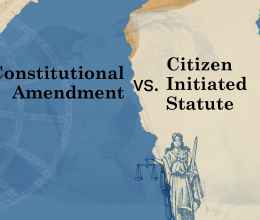The American Civil Liberties Union and Human Rights Watch recently released a startling and heart-breaking report on the drug war called Every 25 Seconds: The Human Toll of Criminalizing Drug Use in the United States. The title’s “25 seconds” refers to the frequency of drug possession arrests in the United States—not selling or making drugs, simply the act of having a drug or, sometimes, merely drug residue.
Every 25 Seconds stands out for its remarkable research, explaining why all laws criminalizing personal drug use and possession must be repealed to restore justice and equality to the legal system. Stories of unjustly imprisoned drug users are linked to system-wide statistical analyses of racial bias and other abuses. The report covers the entire cycle of damage–from the original search to post-prison collateral consequences—that flows from criminalizing personal drug use, and recommends specific reforms that are desperately needed in Ohio.
Learn more about the ACLU of Ohio’s work on statewide drug policy.
While Every 25 Seconds asserts that turning drug users into criminals is a violation of basic individual rights, the moral case against arresting drug users is not new. The human rights implications for Ohio are profound. The ACLU is on the record as opposing drug prohibition and the ACLU of Ohio has advocated strongly in favor of legalizing marijuana. The horrific policy of arresting peaceful drug users, though, is seldom treated as a human rights issue, unlike other violations of bodily autonomy. Laws criminalizing the simple possession or use of drugs constitute an unjustifiable infringement of individuals’ autonomy and right to privacy.
Ohio’s legislature was a leader in marijuana decriminalization, making marijuana possession up to 100 grams a minor misdemeanor in 1977, resulting in a ticket but no criminal record. However, 41 municipalities used home-rule powers to recriminalize pot for more than one million Ohioans. The Ohio Supreme Court rejected the ACLU of Ohio’s claim that the municipal statues were unconstitutional. Excluding marijuana, Ohio has some of the harshest drug possession laws in the country. It is a fifth-degree felony to possess less than five grams of cocaine, less than one gram of heroin, or less than ten doses of LSD. These possession offenses are punishable by a mandatory minimum of six to twelve months in prison and the automatic revocation of other rights, such as a driver’s license. One quarter of all admissions to state prisons are for fifth degree felonies. This is disgraceful.
Ohio’s disastrous drug policy is part of the statehouse to prison pipeline, compounding our mass incarceration crisis.
Every 25 Seconds argues that drug possession should never be a felony even when drug possession is a crime. Ohio legislators to need to make this change immediately. The ACLU has recommended reclassifying all fifth-degree felonies as first-degree misdemeanors. This reclassification and elimination of mandatory minimum sentences will mitigate enormous amounts of harm and racial bias that Ohio inflicts on drug users. As it stands, 78 of the 105 mandatory minimums for Level 3, 4 and 5 felonies (the least serious) are for drug offenses. These automated sentences are the beating heart of Ohio’s statehouse-to-prison pipeline and mass incarceration.
If someone is arrested every 25 seconds for drug possession in the United States, what about Ohio? According to the report, 87% of Ohio’s drug arrests are for simple possession, an average of three drug possession arrest per hour, 24 hours per day, every single day of the year. With 28,600 arrests in 2015 alone—five times as many arrests as for all violent crimes combined—we must shift our priorities immediately to more just, sensible, effective law enforcement.
We hope someday the ACLU and Human Rights Watch can write a follow-up report titled Never, Ever: The End of Arresting Drug Users and the Demise of Mass Incarceration.








